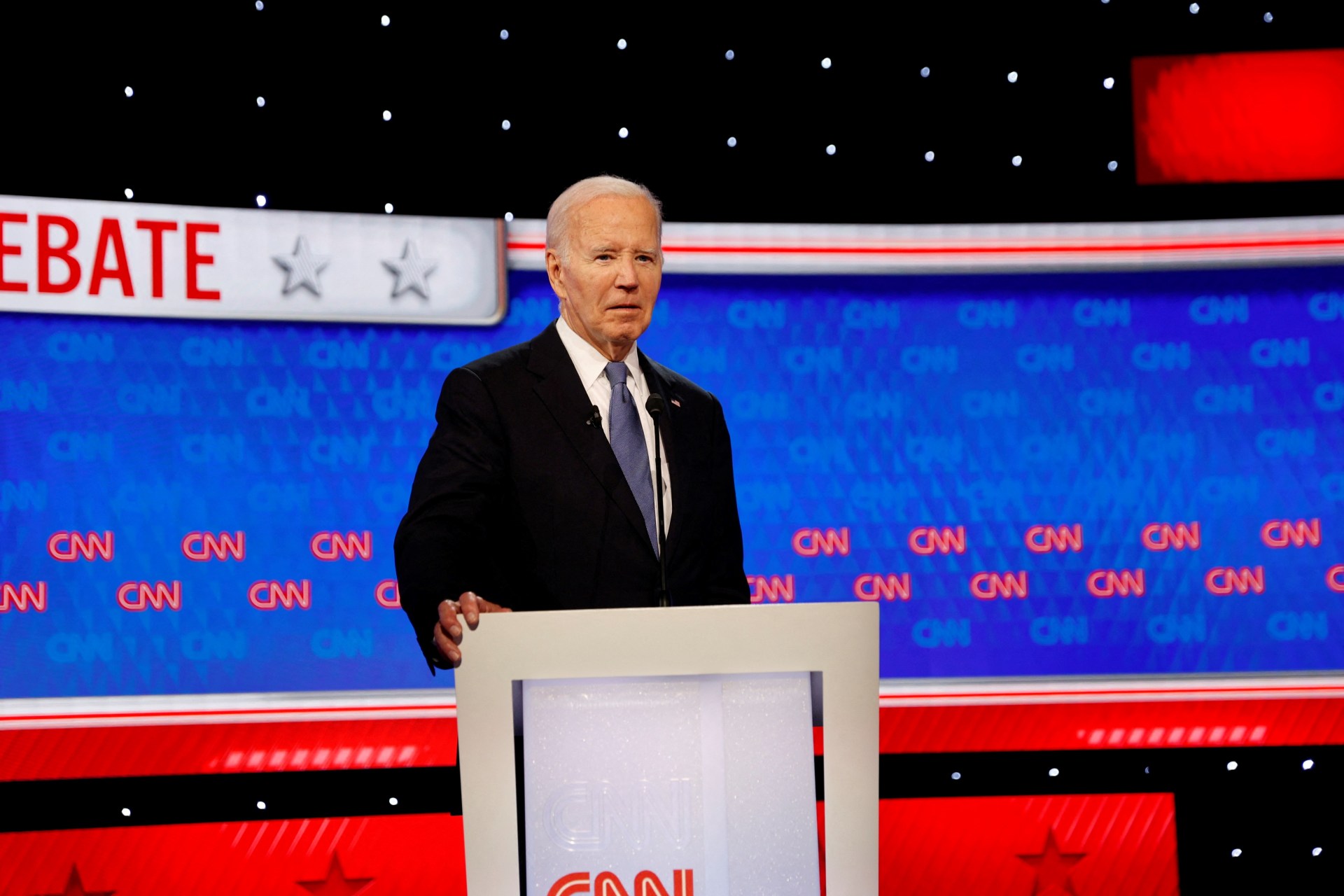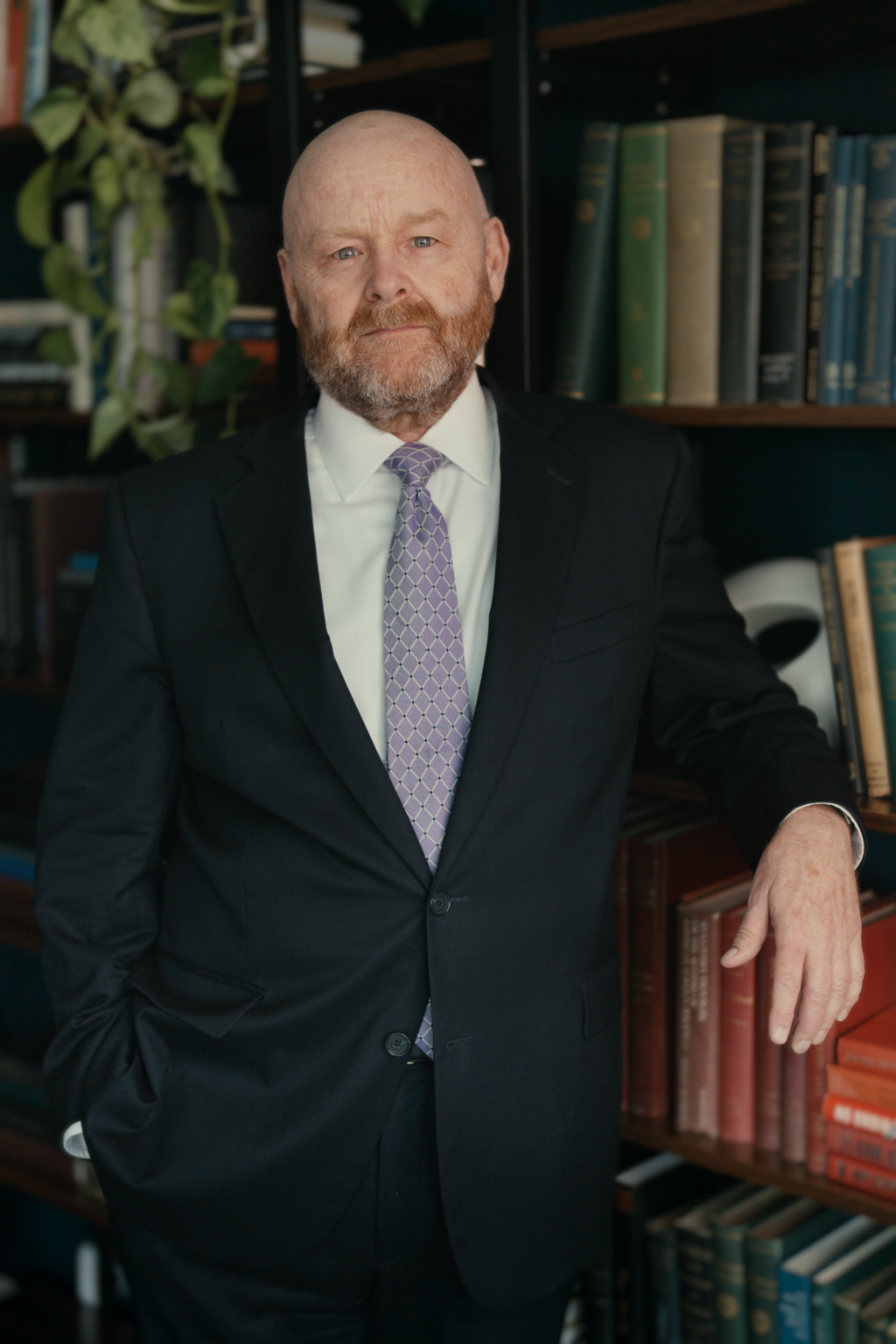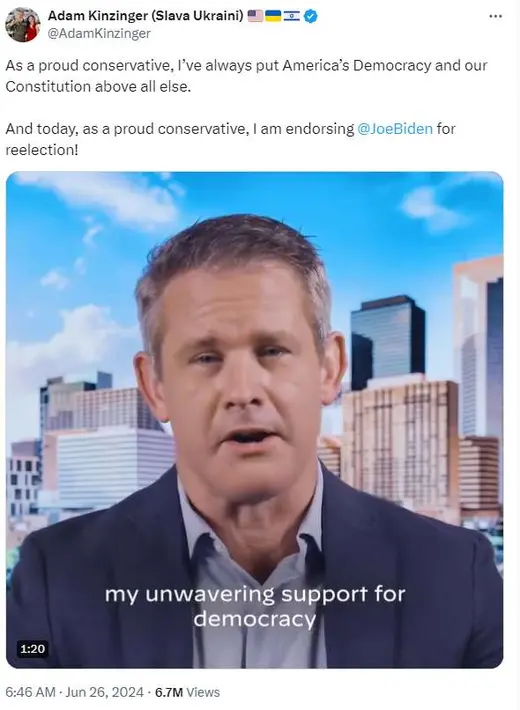Election 2024: Joe Biden’s Disastrous Debate
Each Friday, I look at what the presidential contenders are saying about foreign policy. This Week: President Joe Biden lost his debate to former President Donald Trump and perhaps much more.

By experts and staff
- Published
Experts
![]() By James M. LindsayMary and David Boies Distinguished Senior Fellow in U.S. Foreign Policy
By James M. LindsayMary and David Boies Distinguished Senior Fellow in U.S. Foreign Policy
President Joe Biden hoped for a presidential debate that would shake up the election race. He got what he wanted, but not in the way he hoped.
The headlines scrolling on the chyron at the bottom of the Democrat-friendly MSNBC screen immediately after the debate told the story. “Democratic Strategist: ‘President Biden can’t win.’” “Dem Sources on Biden Debate Performance: ‘He had one thing to do. He didn’t do it.’” “Dem Consultant: ‘It’s hard to argue that we shouldn’t nominate someone else.’”
The reviews didn’t improve overnight. Biden woke up to a New York Times column by Thomas Friedman, who describes himself as a friend of the president, stating that “Joe Biden, a good man and a good president, has no business running for re-election.” Friedman was far from the only friendly voice publicly calling on Biden to drop out of the race. Democratic politicians and strategists are talking privately about finding a new ticket for November.
Could that happen? Yes, but only if Biden chooses to step aside. The delegates to the Democratic National Convention are bound by party rules to vote for him, and he has the votes he needs to win the nomination. The delegates would be freed to vote as they pleased, however, if he withdrew from the race. But an open convention might doom rather than improve the Democrats’ chances of winning in November. The battle over who should succeed Biden is more likely to fracture the party than unify it. Those wounds won’t heal before Election Day.
Who an open convention might pick will likely remain a question for counterfactual histories. Biden doesn’t seem inclined to call it quits. In a visit to an Atlanta Waffle House after the debate, he dismissed talk that he should drop out of the race. At a rally earlier today in Raleigh, North Carolina, he repeated his commitment to winning in November.
The Biden campaign will seek to calm rattled Democrats by noting that Election Day is four months away, that Ronald Reagan and Barack Obama both rebounded in far less time after shaky first debate performances when they sought reelection, and that Biden gets a second shot at Trump in September. What the campaign won’t mention, but commentators will, is that Reagan’s and Obama’s halting performances ran contrary to public perceptions of both men. Biden’s poor performance, however, affirmed existing fears that he is too old for the job.
The focus on Biden’s performance obscured Trump’s. He largely avoided the belligerence that disrupted the 2020 presidential debates. But he kept fact-checkers busy with a string of lies, misstatements, and distortions. Perhaps most notably he accused Biden of having “encouraged Russia” to invade Ukraine. As promised, CNN moderators Dana Bash and Jake Tapper made no effort to fact-check either candidate.
Trump also repeated his claim that he will get the war in Ukraine “settled fast before I take office.” Again, this is a breach of both law and decorum. No one, not even a president-elect, is empowered to conduct their own foreign policy.
But Trump’s comment unintentionally highlights the debate’s impact on U.S. foreign policy. Friends and foes alike follow American politics closely. They decide what they will do based in part on how they think the United States will react. Rising doubts about Biden’s ability to govern and increasing expectations that Trump will be president again will encourage hedging by friends and obstinance by rivals. That will complicate Biden’s effort to run an effective foreign policy in the months to come.
Campaign Update
Former Republican Illinois Congressman Adam Kinzinger endorsed Biden for president on Wednesday. Calling himself a “proud conservative,” Kinzinger said, “while I certainly don’t agree with President Biden on everything, and I never thought I’d be endorsing a Democrat for president, I know that he will always protect the very thing that makes America the best country in the world: our democracy.”
The announcement wasn’t a surprise. Kinzinger has been a Never-Trumper since Trump refused to concede defeat in 2020. Kinzinger served on the January 6 Committee and was driven into retirement by what he called the “fanaticism of the hardcore“ of the Republican Party.
The North Carolina State Board of Elections voted along party lines this week to keep Robert F. Kennedy Jr., Cornell West, and Constitution Party candidate Randall Terry from having their names placed on the state’s presidential ballot. The board’s three Democratic members challenged whether the three third-party candidates had complied with the state’s ballot-nomination procedures. The board’s two Republican members voted to place the names of all three candidates on the ballot. The board’s vote is temporary rather than definitive, and the matter could end up in the courts.
Sixteen Nobel laureates in economics issued a letter this week criticizing Trump’s economic proposals and praising Biden’s. The economists said they were “deeply concerned about the risks of a second Trump administration for the U.S. economy,” adding that “the vagaries of his actions and policies threaten this [international economic] stability and the U.S.’s standing in the world.” They described Biden’s economic agenda as “vastly superior” to Trump’s and hailed his work to make “major investments in the U.S. economy, including in infrastructure, domestic manufacturing, and climate. Together, these investments are likely to increase productivity and economic growth while lowering long-term inflationary pressures and facilitating the clean energy transition.” The Trump campaign responded with a statement saying that “the American people don’t need worthless out-of-touch Nobel Prize winners to tell them which president put more money in their pockets.” Ouch.
What the Pundits Are Saying
The Council on Foreign Relations, which if you don’t know is my employer, launched its candidate tracker on Tuesday. The tracker, which complements the Council’s 2024 election hub, lays out Biden’s and Trump’s positions on ten foreign policy topics, including artificial intelligence, China, Russia-Ukraine, and trade.
City Journal’s Jordan McGillis last month explored the conflicting voices within Trump’s orbit on China policy. McGillis argues that when it comes to China, “Trump’s leading candidates for vice president, secretary of state, and national security advisor can be understood as inhabiting three camps: the ‘freedom fighters,’ the ‘disentanglers,’ and the ‘conservative realists.’ These groups agree that China is a threat but diverge beyond that point.” The question, though, is whether Trump will listen to anyone consistently. He certainly didn’t when he was last in the White House.
The New York Times launched an interactive that summarizes the policies that Trump will implement should he win in November, or in some cases, the policies that his supporters say he will enact. The interactive calls these plans “a radical reshaping of American government.”
Politico launched a ballot access tracker this week that follows the success that Kennedy, West, Chase Oliver (Libertarian Party) and Jill Stein (Green Party) are having in getting on state election ballots. Only Oliver is on the ballot in all seven battleground states: Arizona, Georgia, Michigan, Nevada, North Carolina, Pennsylvania, and Wisconsin. West has yet to make the ballot in any of these states.
Reuters reported that Lt. Gen. Keith Kellogg and Fred Fleitz, who both served on the National Security Council staff under Trump, presented him with a plan to end the war in Ukraine. The gist of the plan is that Ukraine will get more military aid from the United States only if it agrees to begin peace negotiations. If Russia refuses to reciprocate the gesture, the United States will resume aiding Ukraine. Fleitz told Reuters, “I’m not claiming he [Trump] agreed with it or agreed with every word of it, but we were pleased to get the feedback we did.” A Trump spokesperson subsequently said that the Trump campaign’s official statements come only from the candidate himself or an authorized member of his campaign staff. Neither Kellogg nor Fleitz qualify on the latter score. It’s impossible to fully assess the Kellogg-Fleitz proposal based on what has been reported. One question would be how to prevent the Kremlin from agreeing to talks, and then using the negotiation as an opportunity to gain a military advantage over Kyiv.
Victor Cha argued in Foreign Affairs that America’s allies in Asia are in for a rude awakening if they think that a second Trump presidency would be a re-run of the first: “A second Trump administration is likely to be far more disruptive for Asia than the first one was. In Trump’s first term, his most radical foreign policy instincts were blunted by the presence of seasoned appointees; these figures will not be present in a second term. If Trump gets a second chance at the presidency, he is even more likely than before to see allies as trade adversaries, reduce the U.S. military footprint worldwide, befriend autocratic leaders, and challenge the norms that have thus far secured nuclear nonproliferation in Asia.”
What the Polls Show
The Atlanta Journal-Constitution released a poll of likely voters on Tuesday that showed Trump with a 43 percent to 38 percent lead over Biden in the Peach State. The poll had 9 percent of voters favoring Kennedy and 8 percent undecided. Undecided voters either stay home or break for a challenger.
The Trump campaign got more good news in an AARP poll of likely voters in Nevada. The poll showed Trump with a three-point lead over Biden in a two-way race. That lead jumps to seven percentage points when Kennedy and other third-party candidates are included.
The latest New York Times/Sienna College poll found that Americans have more faith in Trump than in Biden to handle major issues. The New York Times story on the poll noted that “inflation and the economy continued to be the top issues for voters, and they overwhelmingly thought Mr. Trump would better handle the crucial economic concerns. Still, a rising share of voters, including a not insignificant number of Democrats, said immigration was the most important issue to them. And these voters were six times likelier to say Mr. Trump was better suited to handle the issue.”
A poll conducted of voters in six battleground states by the Washington Post and the Schar School of Policy and Government at George Mason University found that voters are worried about threats to U.S. democracy but think that Trump will do a better job than Biden in beating back those threats. The Washington Post write up of the poll results argued that “the results offer troubling indicators for Biden, who needs voters who may be unenthusiastic about his candidacy to decide they must reject Trump to preserve America’s system of representative government.”
The public’s preference for Trump rather than Biden in a crisis also showed up in a Quinnipiac University poll released this week. When asked, “If there were a crisis that put the country at great risk, who would you want in the Oval Office to deal with it: Donald Trump or Joe Biden?” Fifty-one percent of registered voters picked Trump, while 43 percent preferred Biden. A Washington Post article assessing the poll concluded: “This is the kind of question that has cut strongly against Trump in each of his two previous presidential campaigns. That’s no longer the case; in fact, it’s suddenly an apparent asset for Trump.” (Emphasis in the original.)
The Campaign Schedule
Donald Trump’s sentencing hearing on his New York conviction is in thirteen days (July 11, 2024).
The Republican National Convention opens in Milwaukee in seventeen days (July 15, 2024).
The Democratic National Convention opens in Chicago in fifty-two days (August 19, 2024).
The second presidential debate is in seventy-four days (September 10, 2024)
The first in-person absentee voting in the nation begins in Minnesota and South Dakota in eighty-four days (September 20, 2024).
Election Day is 130 days away.
Inauguration Day is 206 days away.
Shelby Sires assisted in the preparation of this post.
Election 2024 is off next week in honor of July 4th and will return on Friday, July 12.
This publication is part of the Diamonstein-Spielvogel Project on the Future of Democracy.

